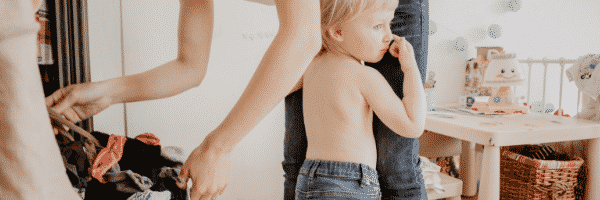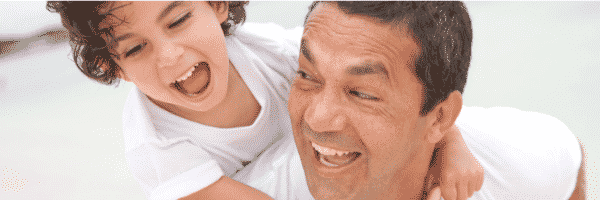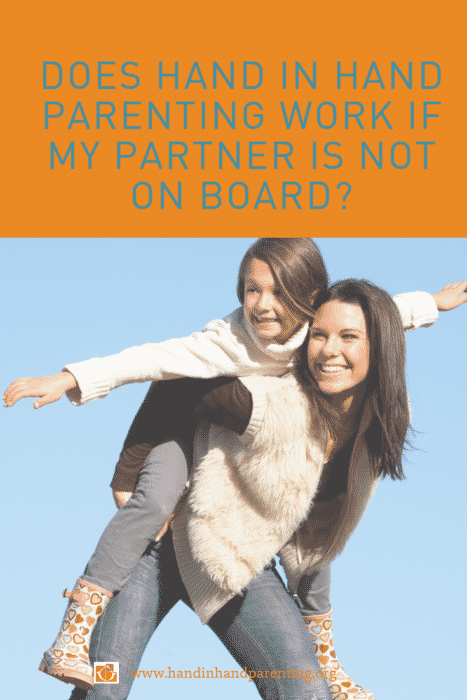
Many parents ask us if the Hand in Hand Parenting Tools work when their partner won't do it. The good news is, yes, yes it will. And in this post, i'll show you how your kids can thrive even if only one parent uses Hand in Hand Parenting.
In order to thrive kids need a place that they can fall apart, a place where they can show just how hard life feels for them right now. They do need that.
But they don't need the entire world to be that place.
So, when a concerned parent asks me “Can Hand in Hand Parenting be done solo?” or, “My partner won't do these tools, what should I do?” I say, “Yes, it can be done by you alone,” and “Don't worry, learn how to partner with your co-parent and all will be fine.”
In fact, I would argue that it's our responsibility as parents not to only give them the emotional support that they need to be able to grow into the emotionally intelligent beings we want them to be. We also need to prepare them for the many kinds of people and situations that they are going to encounter as they navigate life and move through the world.
It would actually be irresponsible for us to set the expectation that everybody is going to just listen when they have big feelings. After all, that's just not the way things go.
In this post, i'm going to outline why a still child benefits even when only one parent practices Hand in Hand Parenting, and the ways you can work together with your co-parent, whether they do or do not live with you, to create a more harmonious household, even when you are coming at parenting with different styles.
Once when my boys were little one of them came home saying some very nasty swear words. He was very young, and he was coming home and saying all these nasty words – sometimes at us to see what the response was, and sometimes just blurting them out.
What I decided to do was to create a safe space in my car for him to be able to experiment. On the way to school in the morning, we would have these “swear fests” where we would say all the bad words we could. We were in the car, no one else could hear us and that was our space. We'd have a lot of fun! We'd laugh and I'd say, “OK! What are the worst words you can think of?”
It was super fun.
But, there's a Part B to this story. The part B was, “OK, when we pull up to school – no more!” I told them that if they were to say that “f' word and all those other words in their classroom or to another kid at school, the consequence would likely be that they would be sent to the principal's office. I let them know that if they said those words to their friends when they were playing, or even just out loud at their friends' houses, on a playdate, for example, and their friend's parents heard, the reality was that those parents might not ask them back.
That information, plus a safe space for them to heal and feel and get the support that they needed and deserve is a balance.
We can apply this same idea when it comes to partnering in parenting.
You Can Parent Differently and Well
There are a couple of misconceptions I want to break apart because I think they are useful in terms of buying into this idea that you and your partner or your ex-partner can parent differently.
We have this misconception that our co-parent, regardless of whether or not they live in the same home we do, must parent in the same way that we do in order for our kids to thrive.
It's funny, because we don't have that same expectation about other things. When we are not feeling emotional we can notice that there are lots of ways to do pretty much everything – from tying your shoes to applying for jobs.
I want to encourage you to think that same way about parenting because the truth is that kids are super flexible and usually they understand what we can and can't handle.
We parents need enough wiggle room from our partners to be able to forge our own paths and build confidence in ourselves that we are good parents. It's much more beneficial for our kids when you can both grow into your own confidence, and that confidence can be about doing things the same way or it can be about doing things in different ways.
I have a client who is a solo mom. She has two boys and in her situation the stakes were high. She was struggling with two little guys who were acting aggressively towards her, when I first met her she was actually getting hurt. She found the behavior incredibly triggering.
Her Ex is very traditional in his parenting, and they were parenting very differently. She was concerned that it wouldn't turn out ok. We talked about and I taught her how to set limits in a really loving, firm way. She also went out and found people, a community, who could support her in her pursuit of peaceful parenting and implementing the Hand in Hand Parenting tools so that she wasn't alone.
Her boys are thriving!
Still, when they are at her house they do a lot of Staylistening, a lot of big feelings come up. She sets firm limits around aggression and they get to feel all the upset that comes up. When they are at their dad's place they don't have that opportunity.
So, its true that sometimes it feels like a lot to handle because that valve of stress and upset and hurts isn't getting to be released at their dad's because they know that he can't handle that, that it's not his way of parenting, but they also know that mom can. So as long as she's getting the support that she needs, which she is, then her boys will be thriving because she can support them in the way that we know works so well.
Drawing On Different Parenting Styles

My husband and I also do not parent in the same way. I'm definitely the “head” Hand in Hand Parenting person and he is not. Sometimes that's actually useful.
Once we had an issue around play guns. As you might guess, I was very anti-guns and gun play, so it felt very uncomfortable, actually terrifying for me, to allow my sons to have Nerf guns or to play at all with guns.
My husband set a limit with me. He said, “Look, Tosha, we all grew up playing with guns and if we didn't have the actual play guns, we turned everything into a gun and we turned out just fine.”
And we really did. We're peaceful.
He said, “It's phase and they'll move through it. Let them explore, let them play it out for themselves.”
I was scared. Honestly, I was really worried for my boys' future. So I sat back and through to myself, “What is really important for me?”
I felt like I was really triggered. I didn't want to play that game with them. I didn't want the play guns shot at me at all. It all felt too uncomfortable for me, and I couldn't handle that emotionally.
So I just set that limit.
But I did let them grab the sticks and guns and play all over the house.
That's how it started, and in the end, I actually got super into it and over a period of months, where I was also able to work on my own feelings about it, and what felt hard for me about it, I could then come in a play with them.
I was able to come in and learn from that situation even though we started out at this place where our idea of parenting was really different. We had to talk about it and figure out what decisions we wanted to make about it and in the end, I stepped back and let him take the lead there.
You Can Let Your Co-Parent Lead Too

A father that I'm working with has a wife who is having nothing to do with Hand in Hand. She's really not into it. But he is committed. He feels passionately about it and he is working right now on learning to set limits firmly and lovingly, particularly around his little guy's homework issues.
What does that look like? After school there is a lot of emotion. It's loud. He says, “Sweetie, it's time to do homework,” and his boy will ask for drinks or food saying he's hungry or thirsty.
In the past what he was doing was getting water and snacks, but what the dad noticed was that it didn't matter how long he put homework off, how many excuses he agreed to, in the end his son's upset still came. So we talked about bringing the limit early and listening to that upset. He sees that then the son can move to the table to do the homework.
But the mom is triggered by the son's big feelings.
She's letting the father bring the limit and Staylisten, to listen to that big upset that is happening, but when she gets to a place where she can't handle it any more she'll come in and say, “OK. Time to do homework.”
She brings a really firm limit when she can't deal with the upset.
That's OK.
We're working towards a place where she can come in more peacefully or perhaps give the dad a sign that she's done listening, or maybe she'll even learn that it can be OK to cover her ears or go into another room and let him do the work.
He's not expecting her to do it the way that he does but they are working towards a place where she can step back from the place she is triggered and let him lead.
To be good, able, confident parents, we need to be true to what feels good to us.
There are some good policies that can be useful to implement when we are talking about partnering in our parenting.
- Let Whoever is Parenting, Parent: A caveat is obviously if there is physical aggression or intense shaming or isolation and punishment then please seek professional help, but if the situation is just a difference in styles and one parent is, for example, sending a child to time out, while the other is moving in and Staylistening it's not the end of the world. A child needs one place to be able to let that steam off. If they can do that with you that tension, those hurts, those upsets, those disconnects will have space to heal.
- Recognise Your Parenting Strengths: Notice what you are each good at and where you each struggle. Depending mostly on how we were parented and how we grew up, we have different strengths. For instance, some of us have an easier time with play. We can be silly or goofy and have pillow fights and wrestling matches and all of that, but some of us feel really tight and uncomfortable around games like that. Work to your strengths. I'm not saying don't work on getting better on the areas you feel like you are weaker in, but keep your strengths in mind and play to them. If you are good at play, go for it. If you are good at listening, if you don't get triggered when your child has big feelings, then you be the main one who listens and allow your partner to step away.
- Notice Where Your Triggers Are: In my family, my husband is very triggered around food issues. He's struggled with his weight his entire life. It's not a secret. He knows, I know, the kids know, and we have an agreement that when there are upsets around food I am the one who steps in. My son, just last night, refused to eat what my husband had made and my husband started getting tight saying, “This is what I made, this is what you are going to have and then he looked at me and said, “I can't do this right now,”. It was like he remembered that he can't deal with things like this. I stepped in and brought a loving limit. It was the same limit that he wanted to bring, essentially, but I don't have the same angst around it, so I could just say lightly, “Sweetie, that's whats for dinner tonight.” We notice where one of us is string and one of us is triggered and then we can parent in a more conscious way and support each other.
- Appreciate What Your Partner Does Well: That doesn't mean when he or she does things how you would do them, it just means today, in the moment, what is it that you can appreciate about your partner? If there's one thing I can promise you, it is that they do have the exact same hopes and dreams for your child as you do. You might parent completely differently, but your goal is the same. You want your little one to thrive and not be held back by fear, make good friends, be kind, be thoughtful, pursue their dreams. If that's the truth, then we can be thoughtful that the paths getting there might be slightly different and that's OK.
There's one other misconception that I think is useful to bust: That it is of upmost importance that our children always come first. Parenting comes with a pendulum of philosophy around it, despite the research.
Most of us grew up with parents that thought that children needed to be seen but not heard, that punishment or consequences and time outs were the way, and so, perhaps, were rewards or star charts, or prizes when you did things well or behaved nicely. We grew up with that, but now the pendulum has swung. We have books about “tiger moms” and articles about “helicopter parenting,” and we feel like our child has to be the centre of our world. That they bring meaning to our lives.
Your Child Cannot Be The Only Thing Which Brings Meaning
But if that is the only thing that brings meaning to our lives then we have a problem. We need to not always be putting our children first. The reality is that if we are thriving our children will follow in our footsteps.
If you are thriving, if you are feeling good, if you are doing well, your child will pick up on that energy, and your child will thrive right along with you.
It isn't magic. It isn't like you don't have to use parenting strategies or think about your parenting, but when we are pouring all of our resources into our children at the expense of our own emotional well-being, then we are not going to get the results that we want to see.
My family recently made a huge move across the world. My middle son has been struggling, as have I.
At first, I spent a lot of time focusing in on how to help him feel better. I was asking myself what resources he needed, what amount of listening he needed, how much time could I devote to spending time with him so that his life started to go well.
It didn't get me very far.
Then, my husband realised that I needed to start focusing on me. He asked how I thought my son could understand that everything was OK when I was walking around like someone had died. I thought he had a point and I started getting myself the support I needed. From listening partnerships to hikes with friends, it looks like all different things, but the point is, I turned my attention back on me.
It's been less than a week and I can already see that he is different. He wakes up differently! A great way to think about this is that putting ourselves first is putting our kids first.
To be good, able, confident parents, we need to be true to what feels good to us. It doesn't mean that we can't change, of course, and it doesn't mean you won't see change, but trying to convince partners to do it your way creates more tension, and the more tension there is in the relationship the harder it is on our kids. So, for me, it doesn't make sense to work that way.
You can parent in different ways and your children will thrive.
Go out, do the best you can, know that you will both make mistakes, know that you will do things your way and your partner or ex will do it their way.
If you take care of yourself, nurture your relationship with your partner, and use some of the strategies here, you can still feel sure that you will raise an emotionally intelligent child. A kind, purposeful, thoughtful child that goes after their dreams and doesn't get held back by fear.
Get daily parenting support in the Hand in Hand Parent Club
Learn more about the free groups, resources

